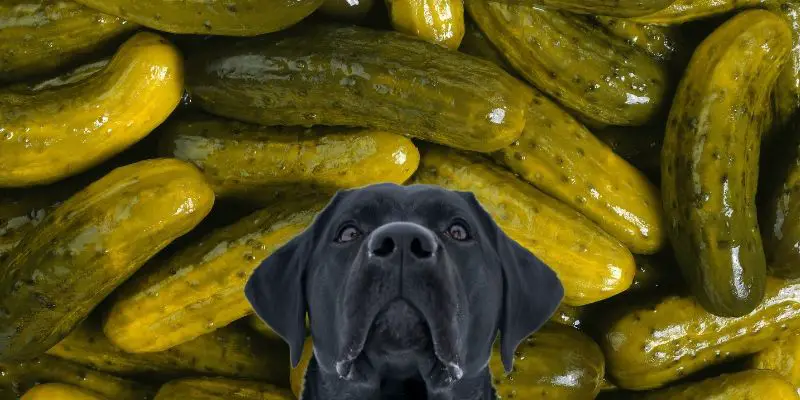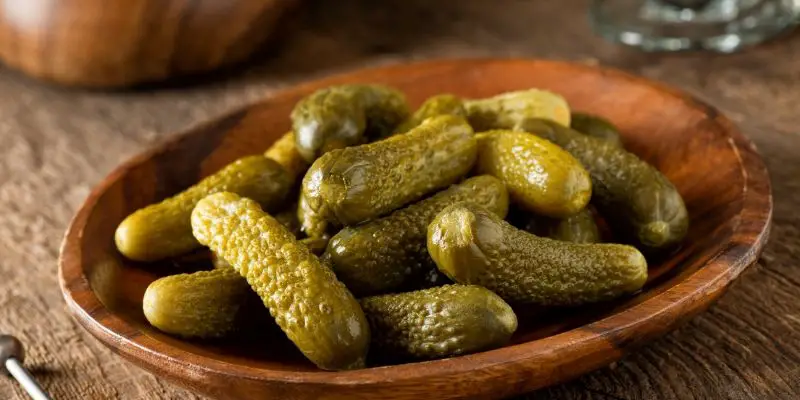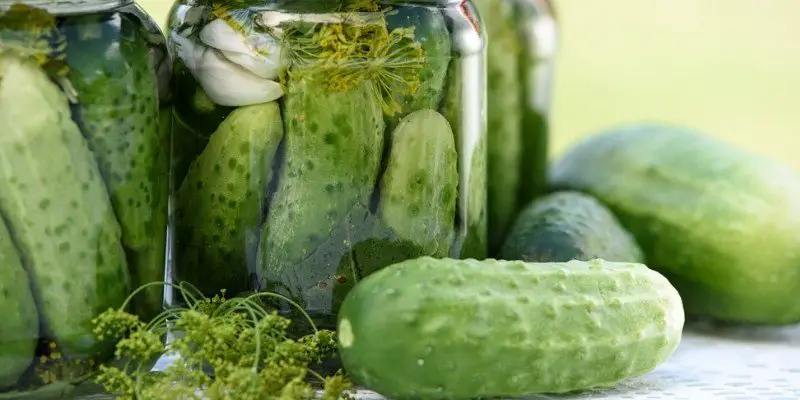When you are enjoying that pickle, the salty piece of heaven, your pup will surely ask for a bite, like he always does! And we bet the furry pal loves that crunchiness of the treat. But can dogs eat pickles?
While you may be lured to share your experience (and let’s be honest, sometimes it’s hard to resist the beginning and those eyes staring hard at your food), pickles might not be the right kind of human food for your pup. But let’s dig deeper.
Do you have a particular interest around “Can Dogs Eat Pickles?” question? Then use the table of contents below to jump to the most relevant section. And you can always go back by clicking on the black arrow in the right bottom corner of the page. Also, please note that some of the links in this article may be affiliate links. For more details, check the Disclosure section at the bottom of the page.
Here's what we'll cover:
Can dogs have pickles?
In short, yes, the dog most likely will survive trying one or two pickles, if you carefully watch out for dangerous ingredients and check pickles jar’s label carefully.
Many pickles, especially the homemade pickle varieties, are prepared with onions, white or yellow. And both of those types can originate anemia problems. Also, there are spices and preservatives in pickles, that are not good for pup’s diet.


What ingredients to look out for and why?
Onions, as mentioned earlier, are dangerous because they lead to the creation of something named Heinz bodies. Those are clumps of hemoglobin that occur when your dog has onions. These clumps cannot transfer oxygen as they should and also die much quicker. That results in hemolytic anemia or even worse.
But, this condition can lead to poor appetite, fatigue issues, and exercise intolerance. And you want none of that for your pet.
Heinz bodies can be developed not only because of the onion but if your dog tries any member of the allium family, like shallots, leeks, scallions, chives, or garlic.
You might also like:
Can dogs eat shrimp? (I bet there’s something you didn’t know)
Full guide on hypoallergenic dog food
And our friend garlic is an often guest in pickles production parties. It is way less possible to cause anemia, but the same as with onions, garlic is not suitable for a dog’s diet.
Vegetable oil in pickles
Amongst other pickle’s ingredients to watch out is vinegar. It’s is made up of water, acetic acid, and flavorings. Some canines have displayed an allergic response to vinegar. It can also upset the pup’s stomach. When a dog consumes too much vinegar, it can lead to diarrhea, vomiting, and gassiness.
Vegetable oil, often contained in pickles, is not harmful in small amounts, but it also can provoke diarrhea. It’s best to avoid those things all together.
Nutmeg and other spices added to pickles
Sometimes they add nutmeg to the pickles. And this spice is pretty toxic to dogs because of myristicin. And don’t overlook the salt. Sadly, one medium-sized pickle can hold about 700 to 1,500 milligrams of sodium. Recommended sodium requirements for dogs is about 100 milligrams per day.
If a dog frequently consumes extreme levels of salt, it will lead to the whole bouquet of problems starting from high blood pressure to a stroke or a heart attack.
Yes, some things that pickles might contain are perfectly safe for your pup, including cinnamon, dill, and other pickling seasonings but the benefits are not prevailing the dangers in pickles’ case.

Can dogs eat pickles with sugar?

Now you know that dogs can try pickles and survive as long as they do not include onions, garlic, nutmeg and a bunch of other stuff. So let’s take a glance at some of the other aspects of dog’s pickle-eating and figure out if the dog can eat sweet pickles and if those are any different from the salty ones.
You are probably aware that pickles are cucumbers. And cucumber is quite healthy on its own for your pet. This vegetable is a low calorie and low-fat bite that is a good nutritional fit for any dog. Even though it’s mostly made of water and doesn’t have much taste.
What makes sweet pickles taste sweet? A good deal of sugar. The amount fluctuates between brands and can be from 7 to 30 grams of sugar per serving.
Side-effects of dogs eating sweet pickles
Sugar is harmful to your dog and can provoke weight gain, diabetes, and even cavities. So, check out those pickle jars closely and look for a product that holds the smallest amount of sugar, not only for the sake of your pup’s health but for your own safety too.
Remember that sugar-free products are also hardly a good option both for dogs and humans since they often include xylitol. This artificial sweetener is very toxic to dogs.
You might also like:
- Best Dog Housebreaking Sprays and How Do They Work (Or Not)?
- Best Dog Paw Cleaner (DIY Softest Paw Balm Recipe Included)
- Dog Subscription Box Option Under $10. Read Full Guide

Are Pickles Bad For Dogs?
Wrapping it up, pickles are not toxic. However, some of their ingredients are a definite no-no for dog’s diet: starting from salt, vinegar to sugar, onions, and garlic. However, if you pick sweet pickles, with low sugar, salt, sodium, and other preservatives levels, dogs can, in general, eat those in a small amount reasonably safe.
But still, try to take it easy with those and only give your dog a little slice every now and again if your pet really really wants it. Otherwise better stick to the crunchiness of fresh cucumber (picking process destroys most of veggies nutrients anyway) and not to gamble on your pup’s health.
Credits: cover photo for this post is sourced from Pixabay.


